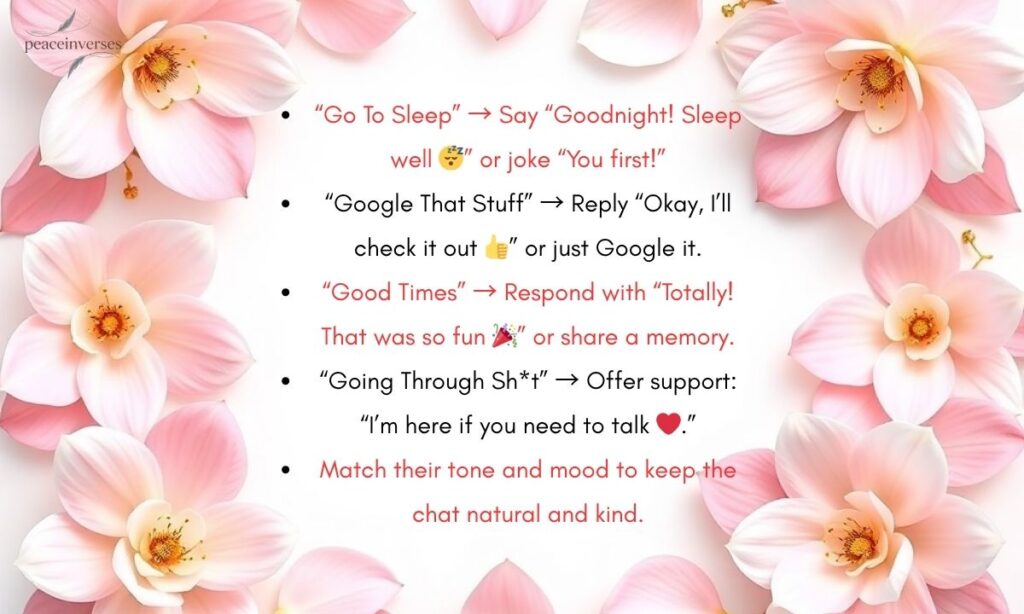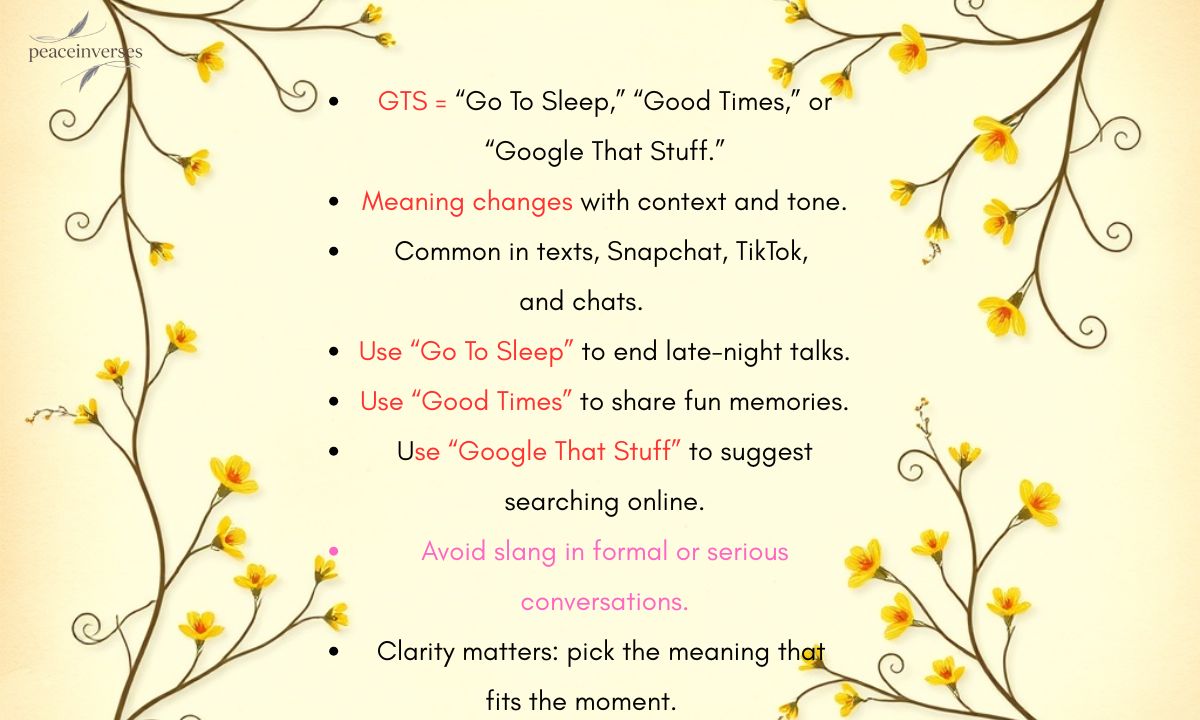Ever seen “GTS” in a text and wondered what it means? You’re not alone. This little acronym pops up everywhere—from late-night chats to Snapchat captions—and its meaning can change depending on the situation. Understanding GTS is all about context, which is why so many people get it wrong.
In 2025, slang keeps evolving, but staying clear and relatable is still key. GTS can mean “Go To Sleep,” “Good Times,” or even “Google That Stuff.” Learning when and how to use it saves you from awkward replies and keeps your messages sounding natural.
What Does “GTS” Stand For in Text?
Slang moves fast, and “GTS” isn’t one-size-fits-all. Depending on where you see it, the meaning can change completely. That’s why the same three letters spark confusion in texts, comments, or captions.
It’s a modern acronym born out of online chats, memes, and social media culture. Context decides everything. If you know who’s texting and what’s being discussed, you’ll figure it out faster.
Learning the right meaning matters. Using it wrong can make you look clueless or even rude, especially if the other person reads it differently.
Common Meanings of GTS in Online Conversations
Go To Sleep
This is the most common meaning in texting. Friends use it late at night to end a chat or tell someone to rest. It feels casual, quick, and slightly playful.
Think of it as a friendly sign-off: “GTS” = “Time to sleep now.” You’ll usually see it after a long conversation or when someone seems tired.
Examples:
- “It’s 2 AM already, you should GTS before class tomorrow.”
- “I’m exhausted… going to GTS now. Talk tomorrow!”
- “You’re yawning in your texts, dude—GTS 😂”
Google That Stuff / Sh*t
On social media, “GTS” often means “Google that stuff.” It’s a quick way to tell someone to look up an obvious or complicated answer themselves.
This meaning can come across as blunt or even sarcastic, so use it carefully. It’s common in Reddit threads, TikTok comments, and group chats.
Examples:
- “What’s the capital of Norway?” → “Bro… just GTS.”
- “How do I boil pasta?” → “Seriously? GTS, it’s everywhere online.”
- “Where’s that meme from?” → “Not sure, you can GTS for the clip.”
Good Times
On Snapchat or Instagram, “GTS” is short for “Good Times.” People use it to celebrate a fun memory or add a cheerful caption to a post.
It’s warm, positive, and often paired with emojis or throwback photos. This version of GTS is all about nostalgia or joy.
Examples:
- “Throwback to our summer road trip—pure GTS!”
- “Beach bonfire last night = GTS 🔥🏖️”
- “Can’t wait for the next reunion. Such GTS with you all!”
Going Through Sh*t
Sometimes, GTS shows a rough or emotional state. People use it to hint that they’re stressed without oversharing details.
This version is less common but more personal. It often shows up in private messages between friends checking in on each other.
Examples:
- “Hey, you okay?” → “Honestly, just GTS this week.”
- “Been really GTS lately, need a break from socials.”
- “Sorry I’ve been quiet—still GTS with finals.”
Gran Turismo Sport (Automotive Use)
Outside texting slang, “GTS” can mean “Gran Turismo Sport.” Car makers like Porsche use it to describe a high-performance model for long drives.
This meaning has nothing to do with texting but is useful to know if you’re reading about cars or gaming.
Examples:
- “Just bought the new Porsche GTS—it’s a beast on the highway!”
- “Saving up for a GTS model; it’s perfect for long-distance touring.”
- “The Gran Turismo video game inspired the first GTS concept cars.”
How Context Changes the Meaning of GTS
Late-Night Chats with Friends
When you’re texting at night, “GTS” usually means “Go To Sleep.” Friends often drop it at the end of a fun conversation to say goodnight.
It’s casual, light, and shows you care about the other person getting rest. You’ll mostly see it after jokes or long chats.
Examples:
- “You’ve been yawning for ten minutes… just GTS already 😂.”
- “We’ll talk about the plan tomorrow, now GTS and dream big.”
- “Midnight pizza is tempting but we should GTS before sunrise.”
Reminiscing about Good Memories
In group chats or captions, “GTS” means “Good Times.” People use it to relive a memory or describe a fun hangout.
It’s positive and often comes with emojis or photos. This version of GTS adds nostalgia to the conversation.
Examples:
- “Remember that summer road trip? Total GTS 🚗🌅.”
- “Last night’s karaoke battle was pure GTS.”
- “Throwback to our high-school days—such GTS with the squad.”
Responding to Repeated Questions Online
On forums or comments, “GTS” is short for “Google That Stuff.” It’s used when someone asks something obvious or easy to look up.
It can sound blunt or sarcastic, so be mindful of tone. Still, it saves time when you don’t want to explain everything.
Examples:
- “Where’s the recipe for this cake?” → “It’s everywhere, just GTS.”
- “What’s the release date for the game?” → “Come on man, GTS before asking.”
- “How do I fix my Wi-Fi?” → “Bro, you can literally GTS the steps.”
Lightening a Serious or Emotional Conversation
Sometimes “GTS” means “Getting Too Serious.” Friends use it to calm things down when a chat feels heavy or dramatic.
This meaning is playful but can also signal that someone wants to keep things light. Tone matters a lot here.
Examples:
- “We don’t need to argue over pizza toppings, we’re GTS 🤣.”
- “Okay, let’s not GTS, it’s just a movie review.”
- “We were joking around and suddenly started debating politics—definitely GTS.”
Catching Up with Old Friends or Colleagues
When reconnecting with someone, “GTS” stands for “Great To See.” It’s a warm way to express happiness at meeting again.
This meaning works best in friendly or semi-formal conversations and often follows a greeting.
Examples:
- “After all these years, it’s truly GTS you again.”
- “Bumped into Sarah at the café—so GTS after college!”
- “Haven’t seen you since graduation, really GTS after so long.”
How to Use “GTS” Naturally in Text or Social Media
Using GTS to End a Conversation Politely
When a chat runs late or someone’s tired, use “GTS” as a polite sign-off. It’s friendly, short, and ends the conversation smoothly.
Add a little warmth or humor so it doesn’t feel abrupt. It works best with friends or close peers.
Examples:
- “I’m falling asleep mid-text… time to GTS 😴.”
- “You’ve got an early shift tomorrow—better GTS now.”
- “It’s been fun chatting but I should GTS before my alarm goes off.”
GTS as a Fun Caption on Snapchat or Instagram
For posts or throwbacks, “GTS” means “Good Times.” Add it to photos, party clips, or vacation snaps.
It’s a quick way to share joy without writing a long caption. Emojis pair well with this meaning.
Examples:
- “Camping under the stars—absolute GTS ✨🏕️.”
- “Brunch squad reunion = GTS 🥞🥂.”
- “Beach volleyball at sunset… pure GTS 🏖️🔥.”
When to Use GTS to Say “Good Times”
You can also drop “GTS” in chats to reflect on a memory. It shows you enjoyed the moment and want to acknowledge it.
This keeps the tone upbeat and strengthens bonds over shared experiences.
Examples:
- “Our movie marathon yesterday was total GTS.”
- “That surprise birthday prank—such GTS 😂🎉.”
- “Loved the road trip playlist, real GTS vibes.”
Using GTS to Suggest Someone Should Google It
When a question is obvious or info is easy to find, use “GTS” to nudge them toward a quick search.
Keep it casual or add a smiley if you don’t want it to sound rude. Tone decides whether it feels helpful or harsh.
Examples:
- “Where’s the nearest coffee shop?” → “Just GTS, there’s one around every corner.”
- “How do I screenshot on iPhone?” → “Haha, seriously… GTS that.”
- “When’s the concert?” → “No clue, you should probably GTS the schedule.”
How to Respond to “GTS” in Different Scenarios

Replying to “Go To Sleep”
If someone tells you to “GTS” at night, respond with a friendly goodnight or a playful comeback.
Keep it short and warm so the conversation ends on a positive note.
Examples:
- “Fair enough, goodnight! I’ll GTS too 😴.”
- “You first! I still have one more episode left 😂.”
- “Alright, I’ll text you in the morning after I GTS.”
Replying to “Google That Stuff”
When someone says “GTS” as in ‘Google that,’ you can either agree or acknowledge it lightly.
Sometimes no response is needed—just go look it up.
Examples:
- “Haha okay, I’ll GTS that now 👍.”
- “Didn’t realize it was that easy, thanks—I’ll GTS.”
- “Alright alright, you win… going to GTS for the answer.”
Replying to “Good Times”
If someone says “GTS” to mean good times, respond with excitement or share more memories.
This keeps the conversation fun and nostalgic.
Examples:
- “Totally agree—those were the best GTS ever.”
- “Haha yeah! Remember the crazy dance moves? GTS indeed.”
- “We have to plan another trip soon. More GTS incoming!”
Replying to “Going Through Sh*t”
If a friend uses “GTS” to mean they’re stressed, respond with empathy and care.
Avoid jokes or slang here—show support or offer help.
Examples:
- “Sorry to hear you’re GTS lately. Want to talk about it?”
- “Take your time to rest. I’m here if you need anything during this GTS phase.”
- “Hang in there, things will get better even if you’re GTS right now.”
Polite, Casual, and Professional Alternatives to “GTS”
Alternatives for “Go To Sleep”
Casual
When you’re chatting with friends late at night, you can swap “GTS” with playful or caring words. These sound friendly and feel more personal.
It keeps the mood light while still suggesting rest. Emojis often make casual goodnights more fun.
Examples:
- “You look wiped out, hit the sack before you drop 😂.”
- “Night owl alert—time to crash and recharge 💤.”
- “We’ll finish the story tomorrow, now get some zzz’s.”
Polite
In a polite tone, you avoid slang and go for clear, warm wishes. Polite phrases sound thoughtful and suit acquaintances or distant relatives.
These phrases show you care without sounding too casual. They also feel friendly but still respectful.
Examples:
- “You’ve had a long day, please get some rest tonight.”
- “It’s getting late; I hope you can sleep well and relax.”
- “Don’t stay up too late, take care of yourself and rest.”
Professional
At work or in formal chats, you should use direct but respectful wording. It avoids slang and keeps your message professional. These phrases show concern for well-being while keeping a business-friendly tone.
Examples:
- “It’s late already, let’s continue this discussion tomorrow morning.”
- “You’ve been working hard; please log off and rest for the night.”
- “We’ll pick up where we left off after you’ve had proper rest.”
Alternatives for “Good Times”
Casual
When talking to friends, use fun, lively phrases that capture the energy of a memory.
These are perfect for captions, group chats, or weekend plans. They’re upbeat and keep the chat lighthearted.
Examples:
- “Last night’s road trip was a blast 🚗✨.”
- “We had such a laugh at the karaoke party!”
- “That game night was so much fun—let’s do it again.”
Polite
For acquaintances or mixed-age groups, go for neutral yet warm expressions. These choices keep the tone friendly without being too slangy or over-casual.
Examples:
- “Dinner with everyone was truly enjoyable.”
- “It was lovely spending time with you all today.”
- “That hike was a wonderful experience.”
Professional
In a workplace setting, choose phrases that are positive but formal enough to suit business emails or meetings. They express appreciation without sounding too playful.
Examples:
- “Our team-building retreat was a valuable experience for all of us.”
- “It was a pleasure collaborating on the project launch.”
- “The conference dinner was a memorable evening of networking.”
Alternatives for “Google That Stuff”
Casual
When texting a friend, you can keep it playful and easygoing. These alternatives are lighthearted but not rude. They make your suggestion feel like a tip rather than a scold.
Examples:
- “You can just look it up real quick.”
- “Haha, that’s easy—search it online and you’ll find tons of answers.”
- “You should probably ask Google about that.”
Polite
In polite chats, avoid sounding dismissive. Polite phrasing makes your suggestion helpful and encouraging. These work well with acquaintances, students, or online groups.
Examples:
- “I think you’ll find more details if you look it up on Google.”
- “You might want to search for a guide online; it’s quite clear there.”
- “It could help to check the official site or resources online.”
Professional
At work, use direct yet respectful guidance to direct someone to resources. This avoids slang and keeps instructions clear and useful.
Examples:
- “You can refer to the company’s knowledge base for the full process.”
- “Please check the official documentation online for accurate steps.”
- “The product manual is available online; you can find the details there.”
Alternatives for “Going Through Sh*t”
Casual
When a friend is venting, use empathetic and relatable words. These show you understand without sounding harsh. Keep it supportive but informal enough for close friends.
Examples:
- “I know you’ve been having a rough patch lately.”
- “Sorry you’re dealing with all that stress right now.”
- “You’ve been going through a lot—hang in there.”
Polite
In polite settings, choose gentle, considerate language that shows care and avoids slang. These phrases express empathy without sounding too casual.
Examples:
- “I heard you’ve been facing some challenges recently.”
- “Sorry to hear you’re having a difficult time at the moment.”
- “I hope things start looking up for you soon.”
Professional
At work, use neutral and respectful wording to show concern while maintaining professionalism. It’s important to stay supportive without being intrusive.
Examples:
- “I understand you’ve been managing some personal challenges lately.”
- “We appreciate your effort despite the difficult circumstances.”
- “If you need support during this challenging period, please let us know.”
Nuances of Tone: Picking the Right Expression
Texting Friends or Peers
Friends expect slang and humor, so casual phrases work best. They keep the mood relaxed and authentic.
However, know when to switch to empathy if the topic turns serious. Tone matters more than the phrase itself.
Messaging Colleagues
With colleagues, you want friendly but professional wording. Avoid slang unless you’re close and it’s appropriate for the culture. Stick to clear, polite phrases that show respect while keeping things approachable.
Communicating with Supervisors or Clients
Here, professional language is non-negotiable. Acronyms like GTS can feel out of place or confusing. Use formal alternatives that show courtesy and ensure no misunderstanding.
Example Phrases to Replace or Reply to “GTS”
Casual Replies
- “You should catch some zzz’s before your alarm goes off.”
- “Haha, yeah, that party was a blast!”
- “Don’t stress—just look it up online and you’ll be fine.”
Polite Replies
- “It was lovely catching up with you this evening.”
- “Please get some rest tonight; you’ve had a long day.”
- “I think you’ll find more info if you search it on Google.”
Professional Replies
- “Let’s resume this discussion tomorrow morning after some rest.”
- “It was a pleasure collaborating on today’s workshop.”
- “You can find the full guidelines on the official site.”
When Not to Use “GTS”
Situations That Require Clarity over Slang
Avoid slang in formal documents, school emails, or legal notes. Acronyms like GTS can confuse or seem unprofessional. In sensitive conversations, always use full words for clarity and empathy.
Cross-Cultural or Professional Communication
Not everyone understands texting slang. In international or formal contexts, GTS can be misread. Stick to clear language to avoid awkward misunderstandings.
GTS in Pop Culture and Internet Slang
GTS in Gaming Communities (Pokémon, etc.)
In gaming, “GTS” often means “Global Trade Station.” Players use it to trade Pokémon or items worldwide. This meaning is niche but still common in fan forums and game guides.
GTS Hashtags on TikTok and Snapchat
On social media, hashtags like #GTS often stand for “Good Times” in captions or throwbacks. They make posts trendier and help people share fun memories quickly.
Key Takeaways: Be Clear and Thoughtful When Using GTS
- Know the meaning first. GTS can mean “Go To Sleep,” “Good Times,” “Google That Stuff,” or “Going Through Sh*t.”
- Context decides everything. Always consider the tone, platform, and who you’re texting before using it.
- Keep it polite in formal chats. Replace slang with clear words when texting colleagues, clients, or teachers.
- Be mindful of emotions. If someone is venting or upset, avoid slang like GTS and use empathetic language instead.
- Avoid slang in serious or professional settings. Acronyms can confuse or feel dismissive in official emails or meetings.
- Use full phrases for clarity. Sometimes writing “good times” or “please rest well” is better than using GTS.
- Match their tone. Reply to GTS with similar energy—fun for friends, formal for work chats.
- Think about your audience. Not everyone knows texting slang, so choose words that make sense to them.
- When in doubt, spell it out. Writing things clearly avoids misunderstandings or awkward moments.
- Respect timing and situation. Slang is fine for casual chats, but clarity always wins in sensitive conversations.
Final Words
Using GTS can make your texts feel quick and friendly, but it’s important to know when and how to use it. Always think about the context and the person you’re messaging before dropping slang. A little clarity goes a long way in avoiding confusion. Stay thoughtful, keep it simple, and let your words match the tone of the conversation.

Muhammad Shoaib is a passionate faith-based writer with over 10 years of experience in creating meaningful content centered around prayers, Bible meanings, scriptural teachings, and heartfelt wishes. He is the lead writer at PeaceInVerses.com, where he shares spiritual insights and uplifting messages to guide and inspire readers on their faith journey.

